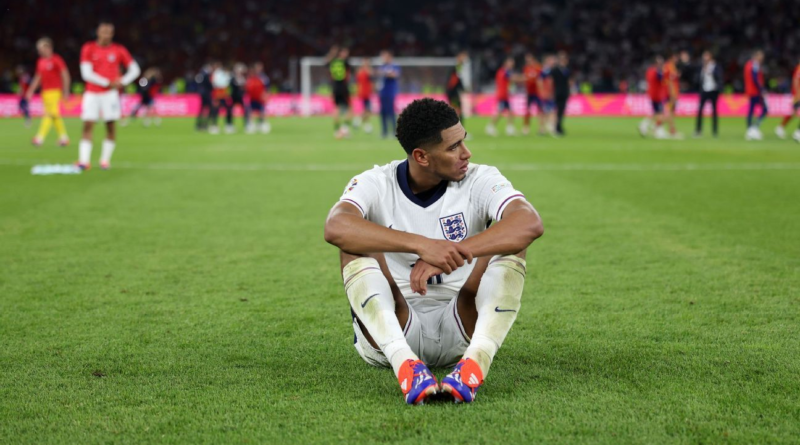Inside England's Euro 2024 camp: Selection struggles, harsh criticism and final failure
BERLIN — England‘s men’s team made more history under manager Gareth Southgate by reaching their first final on foreign soil at Euro 2024 but ultimately failed to end a 58-year wait for a major trophy, losing the final 2-1 to Spain in Berlin.
Southgate described his fourth tournament as an “absolute roller coaster” with the most complicated buildup he has ever known. Over the course of a month, the team attracted opprobrium that was hard to ignore, but they still produced a clutch of memorable moments on their way to a second successive Euros final.
ESPN has been reporting from the England camp throughout this summer. Here is the inside story of the Three Lions’ campaign in Germany which so nearly ended in glory but now leaves only questions for the future.
Early issues
England visualised winning Euro 2024 long before a ball was kicked. After gathering his 26-man squad at St George’s Park over the weekend of June 8-9, Southgate showed them a video of England’s greatest sporting moments such as the 2003 Rugby World Cup final and the cricket team’s 2005 Ashes series win. Images of trophy lifts were intercut with fans lining the streets for parades in Trafalgar Square.
Southgate would later describe England’s involvement as “not football matches but national events.” The clear message was to inform this young group — 12 of whom had never been to a senior tournament — of their opportunity to create history and find an indelible place in the heart of a nation.
To shape the team dynamic, a new four-man leadership group was formed. The absences of Jordan Henderson and Harry Maguire in particular — both unable to prove their fitness — had triggered a reshuffle. Kyle Walker replaced Henderson as vice-captain underneath Harry Kane. Jude Bellingham, then just 20 years old, and Declan Rice were elevated into the quartet. The night before they departed for Germany from Birmingham airport, Prince William visited the squad and shared some words of encouragement.
They left with Southgate speaking publicly about the sheer volume of fitness issues within the squad, most obviously around Luke Shaw who had not represented England or his club, Manchester United, since Feb. 18 because of a hamstring injury. But there was a plethora of concerns, painting an overall picture Southgate admitted was the worst he’d ever known: Bellingham was rested for the warmup matches against Bosnia and Herzegovina and Iceland following a long season at Real Madrid; Kane was still feeling the ill-effects of a back problem which ended his season at Bayern Munich early; Bukayo Saka missed Arsenal‘s final game of the season with a muscular problem and played a limited role in warmup games; Marc Guéhi had only just returned from three months out with a knee problem; John Stones had only started one Premier League game for Manchester City since mid-March and was forced off at half-time against Iceland with a foot injury.
England arrived at their base, the Weimarer Land Spa & Golf Resort on the outskirts of Blankenhain, on June 10. Stones suffered a sickness scare and missed one day of training, but aside from Shaw pursuing an individual programme, England’s full squad trained consistently in the lead-up to the opening game against Serbia.
Everyone’s a critic
England beat Serbia 1-0 with a first-half header from Bellingham. The midfielder looked a world-beater for 45 minutes, exuding a mixture of confidence and quality that made him worth building a team around in a 4-2-3-1 system. But England’s performance level dropped markedly in the second half and the reaction to their opening game was laced with criticism, despite winning the game. Sources have told ESPN that two days after that match, Southgate held a meeting with the full squad — half of whom were not at the last World Cup in Qatar — to discuss the mixed external response to their performance.
There was no formal policy for staying off social media — it is considered an unrealistic ask of this generation for the sheer length of time England were in camp — but Southgate publicly stated he turned his back on it during tournaments a long time ago. Sources have said some players were shocked by the negativity that greeted their win in some quarters. Elsewhere, one player was so unhappy with the line of questioning in one interview that it was subsequently pulled.
A source familiar with the situation told ESPN that some of the players’ families had been put off from taking up the FA travel package for all three group games because it cost £10,000 each and meant everyone staying together and travelling together with minimal flexibility. Another source, an employee at the team hotel, suggested several England players exuded “nervousness,” noting the contrast with the confidence Germany had shown when using their facility earlier in the month.
Things got worse after the second game. England drew 1-1 against Denmark and were lucky to do so, left hanging on for a point after Morten Hjulmand cancelled out Kane’s early opener. Southgate had prepared his players for media criticism, but two things happened that darkened the mood: England fans booed them off the pitch and former captain Gary Lineker used his podcast to call the performance “s—.”
The team knew they had played badly but were not expecting such a respected ex-player — who hosts UK TV’s biggest football show, “Match of the Day” — to use such coarse language and condemn a team that had taken four points from two matches and still sat on top of Group C. Lineker’s full comments were much more balanced, but the damage had been done and he was far from alone in attacking the general standard of play, considered so much lower than could reasonably be anticipated from such an exciting group of players regarded by many as tournament favourites.
At the heart of the issue was a tactical problem Southgate had to solve. England have long lacked a midfielder able to provide the requisite control in midfield similar to Spain’s Rodri, Germany‘s Toni Kroos or Croatia‘s Luka Modric.
His solution was to try Liverpool defender Trent Alexander-Arnold alongside Rice. Alexander-Arnold admitted in interviews that he had been learning the role for about a year but the opening two matches, against limited opponents, had shown him to be well short of the necessary level. He was taken off in both, replaced by Conor Gallagher after 69 minutes against Serbia and 54 minutes against Denmark.
Southgate was scrambling for answers. Sources told ESPN that his post-Denmark assertion that England were lacking “a Kalvin Phillips” was greeted with consternation among some members of the squad, who found it surprising the manager would publicly rue the loss of a player who had been out of form for months. Southgate was reluctant to rip up the game plan, even more so to abandon the 4-2-3-1/4-3-3 shape England had honed over several years.
He often talks about new players learning England’s “patterns of play,” but they were badly lacking in fluidity. Sources told ESPN that during one video analysis meeting, Phil Foden and Bellingham were shown footage of how often they occupied the same space during games.
Around this time, possibly before the second game, Shaw suffered a setback in training. The United defender overstretched in a session and went for a scan. There was no serious damage but any hope of playing in the group stage was ended. That led Southgate to shuffle the pack in personnel but not formation for their final group game, safe in the knowledge they had already qualified and hopeful a spark would be found. It wasn’t.
England were turgid once again in a 0-0 draw against Slovenia, booed at half-time and full-time. After the final whistle, Southgate made a point of going over to England’s supporters and applauding them. Some applauded back, some booed, a couple threw beer cups in his direction. England had topped the group but the atmosphere was borderline toxic.
1:22
Gareth Southgate won’t discuss England future after Euro final defeat
England boss Gareth Southgate reflects on what went wrong for England in their Euro 2024 final defeat to Spain.
Stumbling upon solutions
During a recovery day ride around the team base, winger Anthony Gordon fell off his bike, cutting his face and hands. It felt like a metaphor for England’s eventual fate at this tournament, such was their underwhelming level of play despite topping Group C. This was arguably the toughest period for Southgate to navigate.
Sources have told ESPN that while Bellingham’s elevation to the leadership group was explained as Southgate wanting a direct conduit to the younger members of the squad, some within the camp were surprised he was handed such a prominent role. Bellingham’s form had come under severe scrutiny, seemingly bereft of the dynamism he so often showed in Madrid. He had been willing to paint himself as England saviour in an Adidas commercial, but Southgate found himself considering taking him off on more than one occasion.
Gallagher had failed to impact the game against Slovenia and was replaced at half-time by Kobbie Mainoo as Southgate rolled the dice again in midfield. This time, it appeared the right number had come up. Mainoo kept his place against Slovakia in the round of 16. Any hope that Shaw could yet restore natural balance to the team as England’s only left-footed left-back in the squad evaporated, and so Kieran Trippier continued.
Yet once again, England labored badly against Slovakia. They were 1-0 down and heading out until the dying moments when Bellingham produced a stunning overhead kick (England’s first shot on target) to equalise and force extra time. One source has suggested Bellingham’s “Who else?” goal celebration sent a message “in all directions.” Slovakia were shell-shocked and conceded again early in the additional 30 minutes before England retreated, inviting pressure but holding on.
Speculation grew that cliques were threatening to form within the group, but the Slovakia win helped strengthen some developing friendships. Foden (City) and Mainoo (United) crossed the Manchester divide to develop genuine warmth toward each other. Ivan Toney (Brentford) and Rice (Arsenal) struck up a new rapport. Lewis Dunk and Dean Henderson play for fierce rivals Brighton & Hove Albion and Crystal Palace respectively, but that did not prevent a close bond forming. Deeper links already existed and were revived: Gallagher played with Guéhi in Chelsea‘s academy; Foden and Cole Palmer were at Manchester City together before the latter joined Chelsea last summer. And then were longstanding relationships within the group: Jordan Pickford (Everton), Trippier (Newcastle) and Stones for example.
Sources also told ESPN that rooms were allocated randomly on arrival so the 26 players and around 40 staff were encouraged to mingle and create one big team unit from the outset. England’s media centre — housed in Blankenhain castle around five minutes from the team hotel — was also kitted out with a pool table. After conducting their media duties one day, Toney and Gallagher used the pool table while waiting for a lift back to the hotel. Toney noted that the players didn’t have one at their base. That was quickly rectified.
The day after beating Slovakia, singer Ed Sheeran visited the camp to deliver an acoustic set. Sources have told ESPN that Sheeran had in fact attended all of England’s matches, not just the Slovakia game, in the VIP section, but the FA were trying to find the right time to invite him into the camp. Families were allowed in. Alcohol was consumed.
Southgate sought to strike the right balance between work and play. He was, however, furious when news of England training in a back three — reported at the time by ESPN and other outlets — was made public in the days leading up to England’s quarterfinal against Switzerland.
0:44
Bellingham: Southgate should get to decide his future
Jude Bellingham says Gareth Southgate will always have his respect whatever he decides with his future as England manager.
Finding their feet
England looked more solid in a 3-4-2-1 shape against Switzerland but again fell behind before Saka levelled on 80 minutes, again with their first shot on target, and the tie went to a penalty shootout. England expertly executed their spot kicks, scoring all five. Palmer, Bellingham, Saka, Toney and Alexander-Arnold handed Southgate his third win from four shootouts, a dramatic improvement compared with England’s dismal previous record, exiting seven tournaments on penalties.
His attention to detail was rewarded. Pickford wasted as much time as possible to disrupt Manuel Akanji‘s rhythm to the extent he went for his most reliable penalty. Pickford was later pictured with a water bottle that had simple instructions for every taker based on detailed analysis. “Akanji — dive left” it read. Pickford did and he saved. England brought four analysts to these finals and their work came to the fore. A “buddy system” had been developed where each taker was partnered with a specific teammate to provide one-to-one support around the time they take their spot kick. England coach Jimmy Floyd Hasselbaink worked with the takers on their technique. Players continued long-standing work with a psychologist and also focused on their breathing. Nothing was left to chance.
But the quality of England’s penalties was still in marked contrast to their standard of play. It was difficult to escape the idea they were muddling through the easier half of the draw. Abandoning the 4-2-3-1 shape was further proof Southgate was scrambling for answers. Versatile, yes, but he had made a point for many months about England growing into the side their fans want them to be in 4-2-3-1/4-3-3.
0:48
Celebrations in Madrid, heartbreak in London as Spain score late to win Euro 2024
Watch contrasting fan reactions from Madrid and London as Spain’s Mikel Oyarzabal scores late to win Euro 2024.
There were still signs of encouragement: Palmer was producing lively cameos off the bench; Toney contributed against Slovakia, intelligently setting up Kane for the winner. Fringe players had heeded the pre-tournament messaging about seizing their moment.
And so it proved most emphatically in the semifinal against Netherlands. England’s best half of football by some distance saw Foden finally come to life, Saka work diligently without the ball and creatively with it, while 19-year-old Mainoo looked impressively at home having only made his full Premier League debut last November.
England needed a fortuitous penalty call to go their way to draw level, yet they should really have been ahead. But Dutch coach Ronald Koeman closed the game down in the second half, packing the midfield to pose England a problem similar to that which had stumped them in earlier games: how to break down a stubborn defence.
Enter Ollie Watkins. Southgate answered one of his long-standing criticisms — questionable in-game changes — by sending on the Aston Villa striker and Palmer, who combined brilliantly for a 90th-minute winner which sent England to Berlin.
Southgate celebrated in front of the England fans, shouting “one more” with reference to the final and afterward spoke more openly than ever about the fierce personal criticism. “We all want to be loved, right?” he began. “When you’re doing something for your country and you’re a proud Englishman, when you don’t feel that back and when all you read is criticism, it’s hard.”
1:47
Burley: De La Fuente got the most out of his players
Craig Burley and Frank Leboeuf heap praise on Spain manager Luis De La Fuente following Spain’s Euro 2024 triumph.
Hitting the final hurdle
Southgate believed the win over Netherlands was proof of a switch in mindset. The players had survived the intense criticism and felt there was an opportunity to seize rather than a failure to fear.
England’s best performance of the tournament had created real hope they were ready to end the wait for silverware and so the scramble for tickets was immense. Rice said he could have given away 500 tickets had he been given that many. One source told ESPN the players’ friends and family were offered a travel package to attend the final costing £2,500 which included flights, transfers and a ticket — but not accommodation in Berlin.
Yet in the final reckoning, England resembled a team held together by sticking plasters which Spain removed one by one, each pass a cut that drained energy and belief. Kane’s fitness issues were by now impossible to hide. As Spain dominated possession, he offered nothing as an outlet. Southgate hooked him on 61 minutes with England 1-0 down courtesy of Nico Williams‘ 47th-minute goal.
Sources have told ESPN that Southgate’s loyalty to Kane was rooted as much in his status as England’s all-time record goal scorer as his importance in keeping the group under control without squad stalwarts Henderson and Maguire around to maintain standards. But it was damning for Kane how much better England looked without him. Again, England’s substitutes re-energised the team.
Palmer equalised with a precise finish but Spain’s midfield, even bereft of the injured Rodri for the second half, exhibited a composure and quality that England always lacked. Southgate said Bellingham would have been substituted had England not fallen behind to Mikel Oyarzabal‘s goal in the 86th minute.
The pattern of defeat was damning for Southgate, a conservative game plan undone by a team with greater ambition. And England once again were beaten by the first truly elite team they faced, just as, arguably, was the case in England’s three previous tournaments under Southgate (Croatia in 2018, Italy 2021 and France 2022). Southgate admitted they “didn’t keep the ball well enough” — a consistent issue for England in tournament football dating back years. He never was able to solve the midfield issue.
England returned home on Monday through a private terminal with no fanfare rather than with the parade they hoped for. The wait goes on.




